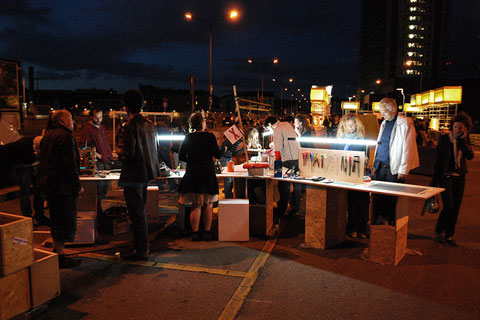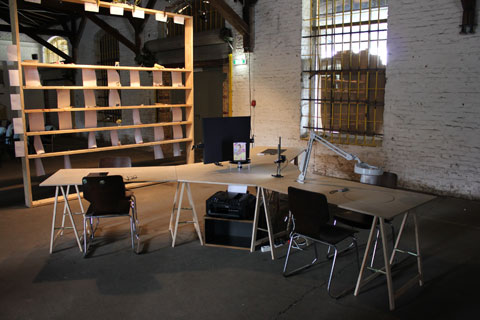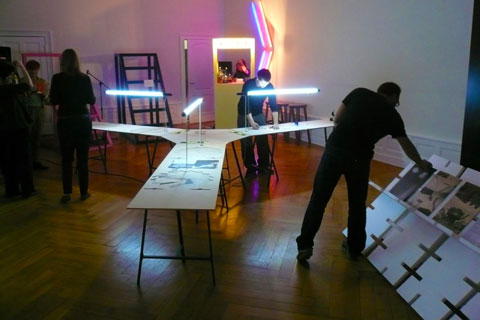
THE Y-TABLE
The Y-Table is not a finished object. It is a customizable workstation, produced on-demand to help create and contest questions among its users. As a sustainable approach, it is a customizable idea that facilitates specific production processes while keeping material excess to a minimum. The Y-Table always keeps its distinctive three-partite form, but its dimensions, surface-features, and programming vary from use to use, from site to site. It was originally conceived by The Anxious Prop for its "Case 3: The Black Swan Issue" at Salon Populaire, Berlin in 2010.
How did the Y-Table emerge?
by Luis Berríos-Negrón
In an effort to review the dialectic of the natural and the political on the one hand, and of the esoteric and scientific on the other, we resorted to an intuition about collectivity. We set forth influenced by early Soviet theater, more specifically revisiting Vsevolod Meyerhold's biometrics and Lyubov Popova's scenography for The Magnanimous Cuckold.
With that scenographic backdrop, we took the Black Swan as model for improbability, focusing on its inverse: low impact, high probability events. But in order to do so, we opted to engage a method to create an initial discourse within the collective, and later with the audience. Paul Ryan, a seminal video artist, developed a technique he terms "Threeing," a performative dynamic for resolving dyadic confrontations in human relationships based on triadic interaction. The main players of Case 3 - Luis Berríos-Negrón, Elín Hansdóttir, Mendel Heit, Fotini Lazaridou-Hatzigoga - maintained continuous dialogue using this technique, a process also projected onto the space and audience at Salon Populaire.
Using Ryan's assimilations between catastrophe and chaos, we then took our feuilleton as the site of intervention itself. We used it as a vehicle to consider the Marxist concepts of Tätigkeit and Parametric Determinsm where we not only transform the art salon into an industrial space, but we open ourselves and the public to a relationship with the assembly line, to stage our potential as micro-practitioners. The feuilleton became the conduit for unassuming improbability, perhaps yielding a personal unknown.
In order to intervene in the feuilleton, the collective decided to produce a curatorial interface, a preparation that both would materially embody the fragmentation of the assembly line, the facilitation of instruments to edit and bind the feuilleton, and the display of such results. This preparation became the first Y-Table and the Black Swan Issue took place at Salon Populaire on October 4, 2010.
Ultimately, the Y-Table is not a finished object. It is a customizable workstation, produced on-demand to help create and contest questions among its users. As a sustainable approach, it is a customizable idea that facilitates specific production processes while keeping material excess to a minimum. The Y-Table always keeps its distinctive three-partite form, but its dimensions, surface-features, and programming vary from use to use, from site to site.
Further versions of the Y-Table have been created for the Maker Lab at the Milan Public Design Festival, the Deutsche Architektur Zentrum, and the São Paulo Architecture Biennial. Colleagues of The Anxious Prop developing these further versions of the Y-Table are Mendel Heit, Patrick Kochlik, Elín Hansdóttir, Fotini Lazaridou-Hazigoga, Jan Bovelet, Miodrag Kuc, Jens Wunderling, Miguel Prados Sanchez, and Luis Berríos-Negrón, all in collaborations with its related groups such as Salon Populaire, Open Design City, Raumtaktik (Matthias Böttger), ZK/U and Wasteland Twinnings.
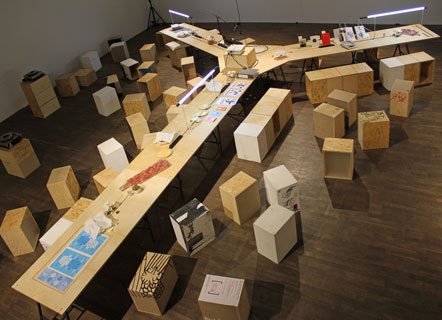
The Y-Table, DAZ Version
Stemming from the use of the Maker Lab Y-Table by Matthias Böttger and Raumtaktik for one of their Future CITIES workshops, the DAZ Y-Table was commissioned and created to discuss the extended field of architecture at Berlin's Deutsche Architektur Zentrum. DAZ Curator Matthias Böttger invites architects, urban planners, artists, filmmakers, poets, designers and other stakeholders of the city to employ the Y-Table in their talks, lectures, debates, dinners, and workshops. Installed in Scharoun Hall, the Y-table becomes a curatorial interface to raise questions about the future of our environments, and to develop and display their works and visions.
The Anxious Prop for the DAZ Y-Table was Luis Berríos-Negrón, Mendel Heit, Patrick Kochlik, Jens Wunderling, and Jan Bovelet, along with Raumtaktik and the DAZ staff.
photo by Mirjam Thomann
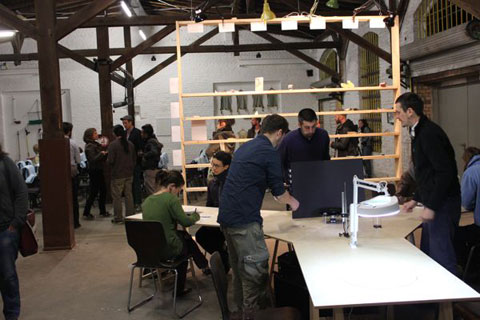
The Y-Table was equipped with a 3D scanner and three analysis stations, offering digital scales, measuring devices and an illuminated magnifying glass, all directly adjacent to a display cabinet from which objects could be observed and selected for investigation. Pairs of investigators would be guided through the process by a facilitator who would begin by creating a 3D scan of the object. This scan would then emerge as a printed colour image from beneath the table in the form of an A4 frame divided into object image and ID, names of the investigators, object specifications and analysis notes. In addition to the more objective analysis tools, each pair came up with imagined narratives to describe the existence of the object on the wasteland. Typically the process concluded by recording a short synopsis of the information generated by the two persons, after which the facilitator would display the analysis sheet next to the specific object within the cabinet allowing for others to read and reinterpret data produced.
The Objective Dialogues Y-Table was directed and produced by Jan Bovelet, Miodrag Kuč, Patrick Kochlick, Jens Wunderling, with participation from Elín Hansdottír, and Luis Berríos Negrón.
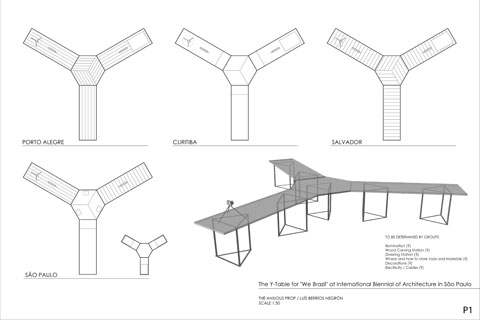
The Y-Tables for "We/Nós - Global Economy / Local Infrastructures" at the International Biennial of Architecture in São Paulo
Curator Matthias Böttger has invited AXP to produce a series of Y-Tables for the German representation at the 2013 São Paulo Biennial of Architecture as part of the larger Goethe Institute's Weltstadt Project. The series of Y-Tables will be collectively programmed and produced with local participants and materials in three different cities, Curitiba (locally produced OSB and TetraPak), Porto Alegre (demolition recovered Araucaria), and Salvador (demolition recovered Jacaranda). The Tables will then be used as curatorial interfaces for a series of workshops in each city that will deal with a variety of urban and social challenges currently being faced by the participating communities, including the repercussions of the so-called "new middle class in Brazil. The workshops will be lead by Matthias along with Michael Marten (BMVBS), Raumtaktik, and Luis Berríos-Negrón. Sponsored by the German Federal Ministry for Transport, Building and Urban Development (BMVBS), and coordinated by the Goethe Institute, the development of the São Paulo Biennial Y-Tables will be created so that not only will they facilitate the discourse for the workshops, but that then they can be left behind as contributions to the local communities. Once done with the workshops, there will be two final venues in São Paulo for the Biennial. The first venue will be the Centro Cultural de São Paulo, where we will install a scale model of the Y-Table for disseminating the project's publications. The second venue will be Casa do Povo, a long-forgotten Jewish community center for communist politics, where a young collective of artists and architects has been working on refurbishing. The group has offered We/Nós to present the final Y-Table and workshop results there. This final Y-Table will be composed of one Table wing/surface of each city that will be shipped to São Paulo, to then be plugged-in into a pre-produced hexagon center. The intent is for this Y-Table to sculpturally project the participant's experience in each city, each with carvings and etchings made onto the Table surfaces as the material memory of the events.
The São Paulo Biennial Y-Tables is directed and produced by Luis Berríos-Negrón with contributions by Miguel Prados Sánchez, Jan Bovelet, Miodrag Kuc, Mendel Heit, and Fotini Lazaridou-Hazigoga.


